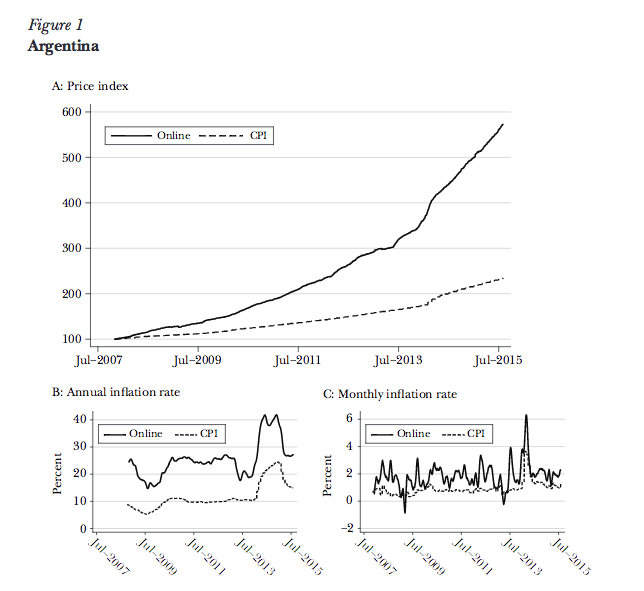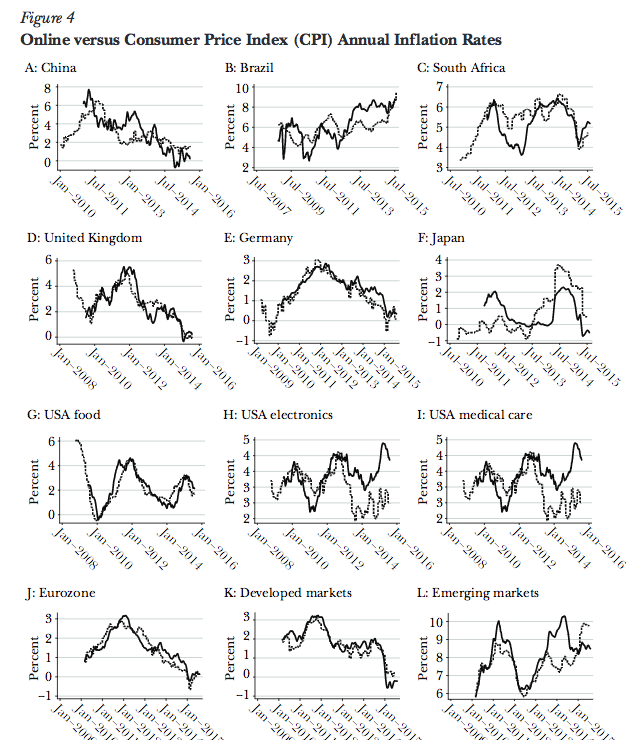今天例行扫了两篇论文(主要是最近开始跑hadoop,各种时间都花在等结果上了...)。
第一篇是和MIT 08年搞的那个利用线上价格来监测通胀指数的项目(Billion Prices Project )有关(简单来说就是搜集了一堆在线商品的价格然后构造价格指数)。
| (8) The Billion Prices Project: Using Online Prices for Measurement and Research |
| Alberto Cavallo and Roberto Rigobon |
| A large and growing share of retail prices all over the world are posted online on the websites of retailers. This is a massive and (until recently) untapped source of retail price information. Our objective with the Billion Prices Project, created at MIT in 2008, is to experiment with these new sources of information to improve the computation of traditional economic indicators, starting with the Consumer Price Index. We also seek to understand whether online prices have distinct dynamics, their advantages and disadvantages, and whether they can serve as reliable source of information for economic research. The word "billion" in Billion Prices Project was simply meant to express our desire to collect a massive amount of prices, though we in fact reached that number of observations in less than two years. By 2010, we were collecting 5 million prices every day from over 300 retailers in 50 countries. We describe the methodology used to compute online price indexes and show how they co-move with consumer price indexes in most countries. We also use our price data to study price stickiness, and to investigate the "law of one price" in international economics. Finally we describe how the Billion Prices Project data are publicly shared and discuss why data collection is an important endeavor that macro- and international economists should pursue more often. |
| Full-Text Access | Supplementary Materials |
 阿根廷的价格指数。看起来网上的价格比实际的汇报的通胀要高很多呀。所以阿根廷就荣幸的登上榜首了么...
阿根廷的价格指数。看起来网上的价格比实际的汇报的通胀要高很多呀。所以阿根廷就荣幸的登上榜首了么...
还有其它国家的,中国的貌似是有高有低,但基本差不多;德国、英国、美国的食品几乎是和传统cpi一致。总体而言,新兴国家的网上商品价格要稍微离实际报道的cpi远一点。不知道是数据搜集方法的原因、还是有一些其他的解释。
第二篇是关于承办奥林匹克比赛的经济学意义。
基本就是帮历届奥林匹克承办城市算了一笔账...基本就是说,短期来看,办奥林匹克是亏钱的,长期来看也是亏欠的(除了盐湖城和巴塞罗那)。
| (10) Going for the Gold: The Economics of the Olympics |
| Robert A. Baade and Victor A. Matheson |
| In this paper, we explore the costs and benefits of hosting the Olympic Games. On the cost side, there are three major categories: general infrastructure such as transportation and housing to accommodate athletes and fans; specific sports infrastructure required for competition venues; and operational costs, including general administration as well as the opening and closing ceremony and security. Three major categories of benefits also exist: the short-run benefits of tourist spending during the Games; the long-run benefits or the "Olympic legacy" which might include improvements in infrastructure and increased trade, foreign investment, or tourism after the Games; and intangible benefits such as the "feel-good effect" or civic pride. Each of these costs and benefits will be addressed in turn, but the overwhelming conclusion is that in most cases the Olympics are a money-losing proposition for host cities; they result in positive net benefits only under very specific and unusual circumstances. Furthermore, the cost–benefit proposition is worse for cities in developing countries than for those in the industrialized world. In closing, we discuss why what looks like an increasingly poor investment decision on the part of cities still receives significant bidding interest and whether changes in the bidding process of the International Olympic Committee (IOC) will improve outcomes for potential hosts. |
还有一段我就不翻译了:
It is difficult to explain Russia’s $51 billion expenditure on the 2014 Sochi Games or China’s $45 billion investment in the 2008 Beijing Summer Olympics otherwise. In countries where the government is not accountable to voters or taxpayers, it is quite possible for the government to engage in wasteful spending that enriches a small group of private industrialists or government leaders without repercussions.
